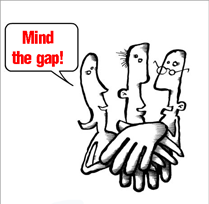Mind the Gap!
25. June 2008 – 13:47 by Citizens Networkpost by Madarász Csaba, e-participation project leader of the CEE Citizens Network
The communicational and technical trends of the internet are offering a wide range of possibilities for channeling communication based contribution from various entities of the society (Artificial Intelligences are a bit behind us).
It is likely to know, that the core values of e-participation are coming from communication.
Although, it might seem, that technology has created this opportunity, but of course this is half of the truth - communication and communicational policy itself is the core factor for more than 50% of the success of e-participation projects , as it is the success factor of non-e participatory projects for 100%,
From the traditional particpation methods practicioner’s point of view (as most of our network members) there is a huge communication gap in Europe around this issue.
First, there is a political-cultural gap.
This might exist all over our continent, but for sure it can be experienced in the Central- and Eastern-European countries as a democratic deficit, and as the result of the communist power (the e-participation notion itself is somehow scientifically tries to merge the e-field with participatory culture, but it is not clear, how does it draw it’s borders from the technological side).
If we talk about politicians, authorities and citizens this gap might be noticed as a general lack of specific cultural elements and the thing called the language barrier. It really sounds stupid in many European languages if we try to translate eParticipation! Like a real alien…But this might not be the biggest problem.
Most of the people just don’t understand, and also don’t know how to think in the context of e-participation. They have a gray area of technology and/or the possibilities of policy and real role of community involvement. Or they are just sceptical by their experience.
We can ask, whether these key players should or not know about the possibilities of e-participation, but until it is not a serious demand of politicians to know about, citizens has to take initiatives for change in better governance. Or it can come from the political business side.
We can add to this point, that enthusiasm based participation itself is not a new thing for the bigger part of the society since the previous regimes were demanding this kind of behaviour as a must. However, new generations and their use of the internet are slowly strenghtening the needed cultural elements for real change in policy.
Second, there is a huge media literacy gap.
The other component of the gap is related to the E-part of participation. The general lack of right consciousness in technology, the low understanding of possibilities are nearly as big barriers as the cultural component mentioned above. Since our region’s countires are creating various strategies and activities for improving ICT coverage and skills, it is not connected with the general improvement of media literacy. We likely accept, that it is coming from the newness of the notion, and the unembeddedness to academia, and not the political lack of willingness to support (of course, there are big differences in our region. Slovenia is obviously taking the lead in this field among us).
On the other hand, it is true, that only a few politicians have a sense of understanding, what trends are shaping, and will shape more the future of governance.
This is a normal trend, when technology shifts. These kind of consciousness recoveries are happening during elections, when internet shows it’s democratic face and plays a more important role, than before.
In the CEE region we are just in front of this change.
The question is, how to support the parallell progress. The needed changes of culture and consciousness among politicians, citizens and businesses. Pep-net is a little bit about this change as well.
Tags: Central-Europe, Culture, eParticipation


